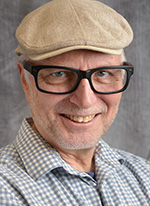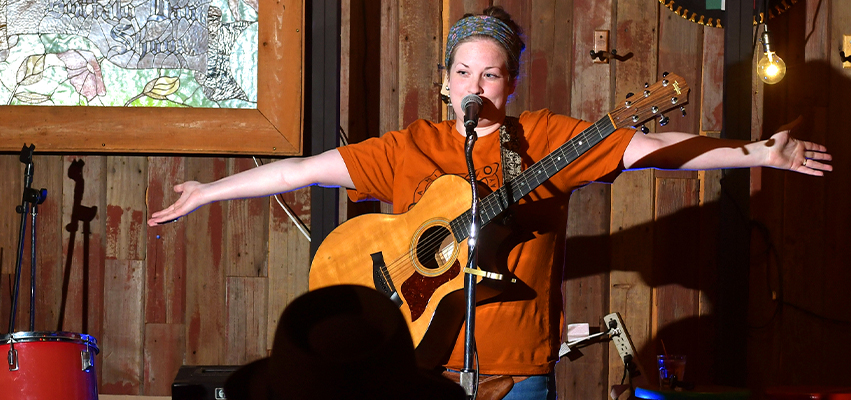Tour the Peoria metro area on a weekend night and you’ll find thousands of people enjoying live music at various venues — men and women in equal numbers grooving to whatever genre of tunes stirs their souls.
Which begs a question if you’re paying any sort of attention: Where are the women on stage?
We surveyed a random weekend in August, using the weekly events calendar posted on the Peoria Music Live Facebook page. Thirty-seven shows on the calendar featured 46 acts, ranging from solos to large bands. Of those, only nine included a female artist.
The dynamic plays out beyond the local scene. The annual Summer Camp Music Festival draws 20,000 music fans to Three Sisters Park outside Chillicothe for three days to hear artists from across the country. This year, 81% of the 172 scheduled acts were comprised entirely of men. Of the remainder, most were male-dominated bands with a woman singing.
Surely in a country where women make up 50% of the population, they possess more than 20% of the musical talent.
To the average man or woman just looking to have some fun on a Saturday night, this might not be a problem. You’ll take your country or metal or funk or classic oldies from whoever plays as long as they’re good.
If, however, you are a woman musician trying to get some crumbs from that 20% of the pie, well yeah, it’s a problem.
NEGATIVE MESSAGES
Sarah Marie Dillard has been playing the local music scene since she was a teenager. She started out awed, naïve and just happy to be there. Now in her early 30s, Dillard is a full-time working musician and a tireless advocate for music and the arts, for the Peoria area as a great place to live and work, and for truth, justice and a better way – especially for marginalized people.
“When you arrive in the music industry as a woman, you find it’s a bit of a club and you’re not invited to be a full member,” Dillard said. “Even if that message is unintentional or subliminal, we’re receiving it. Knowing you’re not invited can be enough to make you want to stay home.”
So, many women do.
Kindall Reuschel, founder of the Peoria Music Live page, scoffs at the notion that men dominate the musical talent pool.
“There are tons of women with talent who can play, but they’re just playing and singing at home,” Reuschel said. “They have other priorities. A lot of the reason more women aren’t out gigging has to do with families they have to take care of. They don’t have the same opportunities to get out.”
Reuschel knows priorities. Ten years ago, she was a homeless single mother. Desperation drove her to clean houses to earn food money. Eventually, she turned that into a thriving business, Hire A Housewife. Now remarried to a musician, Reuschel started the PML Facebook page five years ago. It has grown to more than 16,000 followers.
“I never really considered myself a feminist. I felt like people were too sensitive,” Reuschel said. “But when I started Peoria Music Live and then put my face out there, that changed. I started to feel the undertones in what people say.
“I’m not a performer, but just from the business side, I’ve been told, ‘How do you take care of your kids when you’re in a bar five nights a week?’ I can explain ‘til I’m blue in the face that I’m not drinking, this is work …
“I can’t imagine looking at a guy and saying, ‘You shouldn’t be out in a bar three nights a week,’ regardless of the reason. But this is what happens to women.”
It takes practice to sharpen your instrumental and vocal skills, to build the confidence to perform in public. That’s true for men and women alike. But history and embedded social norms loom differently over women.
“Over a lifetime, that message is loud and clear,” Dillard said. “You can’t put it on one day, one venue, one stage. But women are not stupid … When you see that pattern over a lifetime, you do receive that message, whether it says you’re not allowed or you’re not good enough.
“If you’re not given the chance to get that stage time to build your career, even if you’ve earned it, that means you have to stay in that day job where you’re making 78 cents for every dollar a man is making, meaning you’re not going to be able to save as fast to buy your instruments or invest in your music career. Everything accumulates into a very stunted system – which is easy then to say no one is to blame for it. But that doesn’t mean it’s not real or it’s not harming anyone.”
UNIQUE CHALLENGES
Female musicians are treated differently than their male colleagues. Those interviewed for this story didn’t want to get too specific on the record. Nobody wants a career-killing reputation. But they know what they know and see what they see.
One challenge is physical appearance. It’s not uncommon to see guys on stage wearing ratty tees and hair a mess, like they just rolled out of bed with a hangover.
“But if a female musician walks in the door, the first thing a lot of venue owners do is judge whether she’s attractive enough to play there,” said Jerry Kolb, a local promoter and vocal advocate for female artists.
“As a female, I am acutely aware of how much looks matter,” said Janet Bantz Glavin, lead singer for the trio Goodnight Gracie. “As an aging female” – she’s in her 50s – “I really feel that. I think there’s some pressure to be sexy, as opposed to a talented musician. You hope the quality of music is what sells, but with some venues, you get the feeling that they’re wondering if this is a woman whose looks can get people to come out.”
Sydney Meuth, lead singer for The Grey Governors, got her first lessons in appearance from her mother, a professional opera singer.
“There was such huge pressure on how she looked. Huge,” Meuth said. “How could anyone base my musical ability, or my mom’s … on physical appearance? It’s infuriating.”
Other challenges are more subtle. There’s “The Look” – the smirk directed at the woman with the electric guitar from that guy thinking, “Yeah, right, no way you can shred.” Or “The Comment” – where the woman wearing a Metallica T-shirt gets confronted by a dude who says, “Name me three of their songs.”
Victoria Allen is 21 years old. A finalist in the 2021 Heart of Illinois Fair talent show, Allen performs a mix of pop tunes, but her favorite genre is Tejano. Her style and enthusiasm get people in the audience out of their seats and dancing.
There are exceptions, however. After a recent set, a woman approached her and said, “You need to sing in English. This is America.”
The racism of the comment was self-evident. Sexist? Ask yourself: Would that critic make the same demand of a white guy singing “La Bamba”?
The comment shook Allen. “I get a little nervous when it comes to asking (venues) about a gig,” she said. “I feel like once they find out I sing some songs in Spanish, they’re not going to want me.”
BUILDING A SUPPORT NETWORK
This past spring, Dillard founded the Peoria Music Community Women’s Cooperative. The group meets the fourth Sunday of each month at rotating locations. More than 40 women participate, from teens to octogenarians, and all women are welcome. (Email [email protected] for more information.)
Dillard’s vision is to get beyond anger by sharing information and providing support, mentorship and networking opportunities.
“At our July meeting, we discussed the topic of how much to charge for a gig,” said Rosemary Ardner, who teaches music at Dunlap High School and plays violin in local orchestras. She also teams with husband Aaron to play the clubs as Strat & Strad.
“We want to be fair and reasonable, but it’s kind of like shooting in the dark. What venues pay shouldn’t be that big a secret,” said Rosemary. “But musicians need to talk openly. If a man knows he was paid more than a woman, it’s a good opportunity for him to confront that inequity.”
That spirit of mutual support is at the heart of the cooperative.
“I try to be supportive of every musician I meet, but specifically other females fronting bands,” Bantz Glavin said. “It’s important … to think of the people who mentored you and then pay that forward. In supporting one another, we are giving opportunity to others and adding musical variety at the same time.”
Most of the women in this story spoke of how competition for stage time has hindered their music careers.
“Honestly, the biggest obstacles I’ve seen are women who feel threatened by other women,” Reuschel said. “Women have had to fight so hard for a spot that they feel like we only get 5% of the pie and you’re not going to get into my share of the 5%.”
“The pie is not that small,” Bantz Glavin said. “The pie is unlimited.”
For comparison purposes, look at the growth in sports participation. In the 1971-72 school year, 3.9 million high school students played on school sports teams, but fewer than 300,000 (7.4%) were girls. Then came Title IX. Over the next 47 years, while the nation’s population grew by 60%, participation in high school sports more than doubled. By pre-pandemic 2018-19, participation by girls had increased more than sixfold, to 42.9%.
“We can strive to be better, but it’s going to take work,” said Mindylu Watkins, a veteran singer-songwriter with two college degrees in music, national experience as a singer and a recently released album, “Tuesday’s Child.”
“It’s going to be a constant journey because times and generations change. You can’t get complacent. You can take a break to recharge, but you have to keep the wheel turning and the dialogue going.
“Your car is always going to need fuel. Your flowers will always need to be watered. Our bodies need vitamins and sleep. We have to look at this the same way.”
Kolb, the promoter, is committed to increasing the size of the live music pie – and the share of it that women artists get. He recently worked with Bradley University to establish the Doris K. Kolb Women in Music Concert Series at Dingledine Music Center to honor the memory of his mother, a chemist who spent her life breaking new ground for women and setting a standard for her three sons to live up to.
“My mother brought three Nobel Prize winners to lecture at Bradley,” Kolb said. “I want to bring Grammy winners, women of such stature and talent that my mother would enjoy the show.
“I don’t need to create another date for a popular guy band. That won’t make Peoria more interesting. More opportunities for female artists will make this community a more interesting and better place.”





